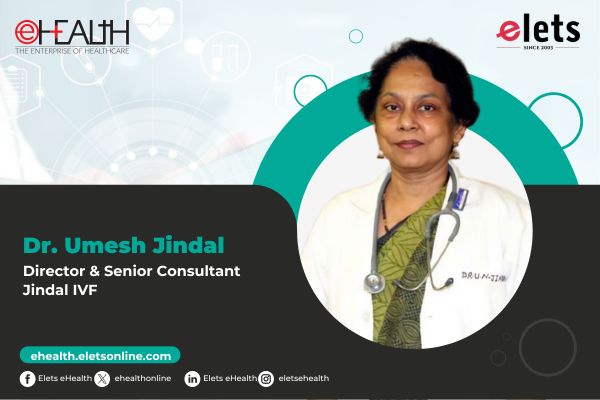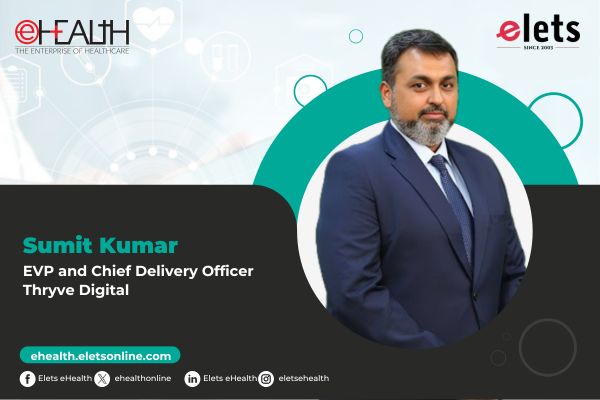
The session on “Innovative Technologies reshaping Health Infrastructure” was conducted at Elets Global Healthcare Summit & Awards that revolved around the potential benefits and challenges of technologies, and identified best practices for incorporating them into healthcare systems in a way that improves patient outcomes and supports the overall health infrastructure. Edited excerpts:
Ranjith Verghese, Sr. Director- Business Transformation & Change Management, IQVIA

Big Tech has been a major driver of innovation across various industries, including healthcare. Companies like Amazon, Apple, Microsoft, Google, and Oracle are all exploring different areas of healthcare to bring new solutions to patients and providers, stated Ranjith at Elets Global Healthcare Summit & Awards in Dubai.

He added, “One of the key trends in Big Tech is the use of Artificial Intelligence (AI) and Machine Learning (ML) in healthcare. Amazon is focusing on AI and ML in life sciences, with a particular emphasis on primary care. The company recently acquired One Medical and is exploring the Amazon Clinic concept to provide healthcare services to consumers beyond its employees. The integration of Alexa and other digital experiences is another area where Amazon is pushing the boundaries of healthcare.”

“Apple is leveraging its expertise in gadgets, such as the Apple Watch and iPad, to improve healthcare delivery. The company is exploring ways to bring home care to patients and is investing in digital health tools like the CareKit framework”, he further added.

He averred, “Google is another company that’s focused on precision medicine and clinical search engines. The company’s Cast Studio is a unique platform that helps researchers and clinicians collaborate on medical imaging data.”
In the Middle East, Big Tech is playing an increasingly important role in the healthcare industry. The region has a large population and a growing demand for innovative healthcare solutions. Companies like Amazon, Apple, Microsoft, Google, and Oracle are exploring various opportunities to bring new technologies and services to the region.
However, there are also challenges that need to be addressed. For example, data privacy and security are major concerns in the healthcare industry. Companies need to ensure that patient data is protected and secure.
Concluding the session he stated, “Overall, Big Tech is transforming the healthcare industry with its innovative solutions and technologies. The industry is constantly evolving, and it will be interesting to see how companies continue to push the boundaries of what’s possible in healthcare in the coming years.”
Himanshu Puri, Head of Information Technology (CIO), King’s College Hospital London, Dubai
The healthcare industry is currently in a phase where it is moving away from just taking care of patients who come in for simple ailments like fever or cough. The demographics of patients have changed, and the demand from patients is evolving. This shift has led to bringing patients into their own care system, something that was not discussed a decade ago. Families are getting more involved in the care of their loved ones, and the outcome of patient care is no longer limited to just clinical treatment.
He stated, “In the past, patients from this part of the world had to travel out for medical tourism. But there is now an influx of patients coming for medical tourism, creating awareness in the population, governments, and provider segments. Technology is the most influential factor in catering to all these changes in demand, and data is creating the foundation upon which a lot of technology is being built.”
Telehealth is not a new concept, as teleconsultation dates back to the mid-1930s. However, remote patient monitoring is a relatively new addition to the healthcare industry. There are challenges in taking care of difficult populations and managing complicated diseases that people are getting at much younger ages.
“The healthcare industry is ever-evolving, and technology is evolving even faster than healthcare. Bringing all of these changes together to bring the outcomes that we need is a tricky situation, but everyone in the industry is fighting that race every day”, he added.
The role of technology cannot be overemphasized in healthcare, and its integration is the key to achieving improved outcomes. The use of data analytics and machine learning can help healthcare providers understand patients’ needs better and personalise treatments.
Padam Kafle, Head of Information Technology & Automation, Aster Hospitals, UAE
The demand for healthcare has been rapidly increasing, especially in the wake of the ongoing pandemic. However, the focus today is not only on secure healthcare but also on ensuring that people have access to quality healthcare, regardless of their location. In this regard, technology has become an integral part of healthcare delivery, allowing patients to receive care remotely.
He explained, “Hospitals and healthcare providers are constantly exploring new ways to provide healthcare services to patients in the comfort of their homes. The aim is to provide pure healthcare by leveraging various gadgets and technology. For instance, the Apple watch is a great example of how technology is being used to monitor patients’ cardiac care.”
He further added, “However, there are other gadgets that healthcare providers can use to monitor a patient’s health remotely. These gadgets can track skin temperature, blood pressure, and other vital signs, which can be crucial in identifying potential health issues before they become severe.”
The data collected from these gadgets can then be connected to a care provider, who can monitor the patient’s health remotely. This is known as remote care, and it has become increasingly popular among patients who want to avoid crowded hospitals and clinics.
In addition to remote care, there is also the concept of home care. In this model, healthcare providers dispatch medical professionals to a patient’s home if remote care is not possible. This ensures that patients receive the care they need, even if they are unable to leave their homes.
Jaleel Rahiman, Director – IT & PRIME Digital, Prime Healthcare Group LLC
The world of healthcare is rapidly evolving, and technology is playing a significant role in the industry’s transformation. However, as our world becomes increasingly digital, it is essential to not get too caught up in the technology itself but focus on the value it brings to both the organisation and the patient.
“To achieve this, healthcare organisations must identify the specific problems they aim to solve with technology and evaluate how its implementation will benefit their patients. For example, chronic patients who regularly require medical attention can benefit from monitoring their vitals at home. With the help of technology, data can be collected and analysed, allowing healthcare professionals to take timely corrective action when necessary”, he stated.
The implementation of such technology may sound simple, but it requires a careful approach that combines various technological components such as big data, IoT devices, and alert systems. It is crucial to ensure that data is not siloed and that all these technologies are stitched together, creating an end-to-end process.
He concluded by saying, “The key to success lies in focusing on the value that technology brings to the organisation and the patient, rather than getting caught up in the technology itself. It is essential to assess the problem’s magnitude and how technology can solve it, making it easier for healthcare professionals to provide better patient care.”
Aliasgar Bohari, Senior Director, Information Technology, Zulekha Hospital
Providing quality healthcare to patients is the top priority of any healthcare facility. However, delivering this service efficiently and effectively can be a challenging task. In today’s age of technology, healthcare providers have a plethora of options to choose from to enhance their patient care services. But, the question remains, what technology should be implemented to ensure the best care for patients?
“The answer lies in understanding the needs of your patrons. Each patient has unique requirements, and it is crucial to identify these needs to provide the best possible care. Installing technology that does not cater to the patients’ requirements is a waste of time and resources”, he averred.
Healthcare facilities have access to numerous technological advancements that can aid in providing better patient care. From Telemedicine to Electronic Health Records (EHRs) and Artificial Intelligence (AI), the options are endless. However, not every technology is suitable for every patient or facility.
He stated, “The COVID-19 pandemic has highlighted the importance of data in healthcare. Business intelligence tools have played a crucial role in enabling healthcare providers to make data-driven decisions. Understanding the data collected, such as clinical data, appointments, and no-show data, can help healthcare providers offer better patient care.”
However, data should not be kept in silos. It is crucial to integrate data from various sources to gain a holistic view of a patient’s health. This integrated data can help healthcare providers tailor their services to the specific needs of their patients.
Dr Sayf Abdelrahman, Chief Executive Officer, Topmed (Health Catalyst Exclusive Service Partner, MENA Region
New technologies have revolutionised the way we live, work, and interact with each other. From Artificial Intelligence and the Internet of Things to Blockchain and 5G, new technologies have brought about unprecedented opportunities and challenges. However, these technologies also come with a great burden on the shoulders of CIOs, who are responsible for selecting, implementing, and getting results from these technologies.
He commenced the session by giving an example, “5G technologies are set to transform the healthcare industry in a big way. With the help of robotic surgery procedures, one consultant in America can perform a live operation on a patient in the Middle East in real-time, controlling the robots himself. This is a significant breakthrough in healthcare as it allows patients to access specialist medical care without traveling long distances.”
“However, with great opportunities come great challenges. The implementation of new technologies is a complex process that requires careful planning, resources, and expertise. The burden of this process falls on the CIOs, who are responsible for ensuring that the technology is selected, implemented, and integrated into the organization seamlessly. The CIOs are also responsible for ensuring that the technology delivers results, which can be frustrating if the technology fails to meet expectations”, he concluded.
Be a part of Elets Collaborative Initiatives. Join Us for Upcoming Events and explore business opportunities. Like us on Facebook , connect with us on LinkedIn and follow us on Twitter , Instagram.
"Exciting news! Elets technomedia is now on WhatsApp Channels Subscribe today by clicking the link and stay updated with the latest insights!" Click here!
















